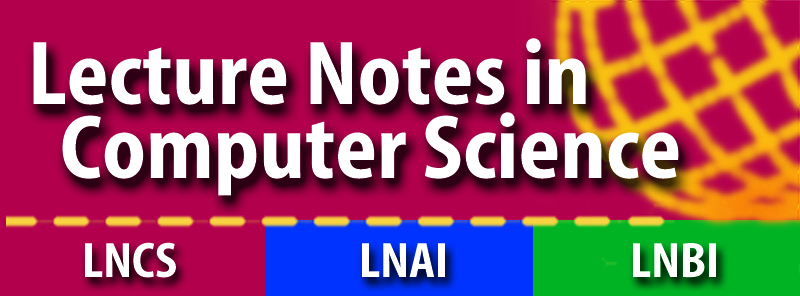General Rules
All papers must be written in English and they will be peer reviewed by at least three members of the Programme Committee. They will be judged on novelty, technical soundness/social scientific content, comparison to related work, validation aspects.
Both theoretical and applied research papers are welcome.
Submitted papers must not substantially overlap with papers that have been published or that are simultaneously submitted to a journal or a conference with published proceedings. Failure to clearly identify any duplication or overlap with other papers is ground for rejection without full review.
Paper Format and Instruction for Authors
Submissions are anonymous.
Papers should be submitted in Portable Document Format (PDF). All submissions should follow the LNCS template up to date at submission time. Submitted papers should be at most 16 pages (using 10-point font), excluding the bibliography and well-marked appendices, and at most 20 pages total. Committee members are not required to read the appendices, so the paper should be intelligible without them. All submissions must be written in English. Papers must be submitted to the submission web site. Only pdf files will be accepted. Submissions not meeting these guidelines risk rejection without consideration of their merits. Authors of accepted papers must agree with Springer LNCS copyright and guarantee that their papers will be presented at the conference.
We accept (a) Full Papers; (b) Position Papers; (c) Work in Progress.
Position Papers and Work in Progress, should be at most 10 pages long (using 10-point font), excluding the bibliography and well-marked appendices, and at most 12 pages total.
They must have at the beginning of the paper's title the words "Position Paper:" or "Work in Progress:", respectively.
Submitted papers must adhere to the ACM Copyright Policy and the ACM Policy on Plagiarism.
Structured Reporting
We encourage authors to include well-defined sections on methods, results, and discussion. We ask to describe all limitations the authors are aware of.
We strongly encourage authors to provide pre-workshop PDF and Easychair submission with a structured abstract.
A structured abstract is a concise sign-posted description of a study's 1. background, 2. aim, 3. methods, 4. results and 5. conclusions.
Consider this structured abstract adapted from STAST 2018 as an example:
Background. 3-D Secure 2.0 (3DS 2.0) is an identity federation protocol authenticating the payment initiator for credit card transactions on the Web.
Aim.
We aim to quantify the impact of factors used by 3DS 2.0 in its fraud-detection decision making process.
Method. We ran N=64 credit card transactions with two Web sites systematically manipulating the nominal IVs machine_data, value, region, and website.
We measured whether the user was challenged with an authentication, whether the transaction was declined, and whether the card was blocked as nominal DVs.
We established three logistic regression models to quantify the impact of the predictors on the likelihood of the transaction outcomes.
Results.
A change in machine_data, region or value made it 5-7 times as likely to be challenged with password authentication. However, even in a foreign region with another factor being changed, the overall likelihood of being challenged only reached 60%.
When in the card's home region, a transaction will be rarely declined (< 5% in control, 40% with one factor changed).
However, in a region foreign to the card the system will more likely decline transactions anyway (about 60%) and any change in machine_data or value will lead to a near-certain declined transaction.
Conclusions.
We found that the decisions to challenge the user with a password authentication, to decline a transaction and to block a card are governed by different
weightings. 3DS 2.0 is most likely to decline transactions, especially in a foreign region. It is less likely to challenge users with password authentication, even if machine_data or value are changed.
Consider submitting supplementary documentation and study materials (e.g., questionnaires, code books) in the appendix or the pre-registration repository.
Proceedings
Accepted papers will be published as post-proceedings of Springer's Lecture Notes in Computer Science series.Review Policy and Conflict of Interest
STAST adopts a double blind review policy. Papers will be reviewed by at least three PC members. The authors can declare conflicts of interest with PC members at the moment of submission or by informing the PC chairs or the organizers.
Accepted Papers Policy
At least one author of each accepted paper is required to attend the workshop to present the work. Otherwise, the paper will be excluded from the proceedings.
Submission
Contributions should be submitted electronically via EasyChair.
The submission phase is CLOSING soon.


